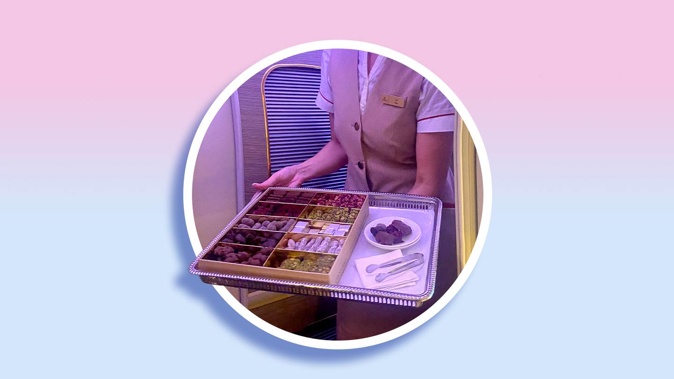
A report from the University of Sydney has discovered certain foods including chocolate and dairy can improve sleep on planes
Jet lag is proof that man was not made to fly.
Complaining about waking up too early because of your recent holiday to Europe might sound like the ultimate ‘first world problem’, but Jet Lag Disorder is a real medical condition.
Among the many symptoms given by the Mayo Clinic are sleep problems, fatigue, brain fog, diarrhoea and mood swings. I’d add waking up on a train, on the wrong side of Austria to that list.
According to the clinic, flying east is harder than west and travellers should factor in a day to recover for each time-zone crossed.
The symptoms are worse the further you travel.
So, the fact that airlines including Qantas and Air New Zealand are trying to make long haul journeys of up to 20-hours a regular occurrence means that jet lag will soon be unavoidable. Although, there are some remedies and possibly foods you can take to combat grogginess.
Research at the University of Sydney’s Charles Perkins Centre, which comes as part of a partnership with Qantas’s long-haul programme, has shown that you can combat jet lag with what you eat.
Trials run on ultra-long distance flights between Sydney and London, aboard Qantas Boeing 787s focused heavily on meal services.
The experiment showed that sleep can be encouraged, and improved for travellers eating certain ingredients. Their advice was to choose chicken and fish with stodgy carbohydrates to help drift off.
Warm soup and dairy-based desserts will also help passengers catch 40 winks on the wing.
“The aim was to promote the brain’s production of the amino acid tryptophan (‘Tryp’) to help passengers drift off more easily,” read the report from the University of Sydney.
Ingredients such as chilli and chocolate were found to be rich in this neuro-chemical ingredient.
“The early findings have given us optimism that we can make a real difference to the health and wellbeing of international travellers thanks to this partnership with Qantas,” said Peter Cistulli, Professor of Sleep Medicine at the University of Sydney, who helped author the report.
/cloudfront-ap-southeast-2.images.arcpublishing.com/nzme/S2QQ6ILTQBCS5G72K5GOJ5AP2Q.jpg)
The study required passengers to control sleep and food intake for a week before the flight, and monitored recovery 14 days after. Photo / Charles Perkins Centre, The University of Sydney
Get better sleep in economy class
It’s not just what you eat, but when you eat.
Meal services were adjusted to be earlier or later, to align with the time at arrival.
Food was just one ingredient in the sleep control study. The University of Sydney study showed that sleep quality took a more holistic approach than a few squares of chocolate.
Passengers taking part were given a whole regime to follow, which involved monitoring exposure to light, food and exercise. This started seven days prior to departure and continued monitoring two weeks after arrival.
The small control group which followed the strict rules reported less jet lag, better sleep while travelling and performed better at cognitive tests two days following the flight, versus those not following the regime.
Parallel research has been done by other teams to manage crew well-being on these flights, which also draws on experience from other ultra-long haul flights operated by Qantas.
Outgoing CEO of Qantas Alan Joyce, who helped launch the partnership, said that the findings would be carried over into long haul services across all cabin classes.
Better sleep in economy class cabins is currently an area of focus for airlines on long haul routes. As Qantas and Air New Zealand go head-to-head flying New York to Auckland direct, the Australian carrier is focusing on passenger sleep regimes aboard QF4, whereas NZ1 will soon be launching bookable lie-flat bunks in September.
Sleep therapists have had mixed appraisals of Air New Zealand’s Skynest bunks, however they advise travellers to think carefully when they book their three-hour slot. They advised travellers to book a slot closest to their natural sleep time, or else closest to arrival.
If you have trouble getting to sleep, you could always pack a bar of chocolate.
Take your Radio, Podcasts and Music with you









